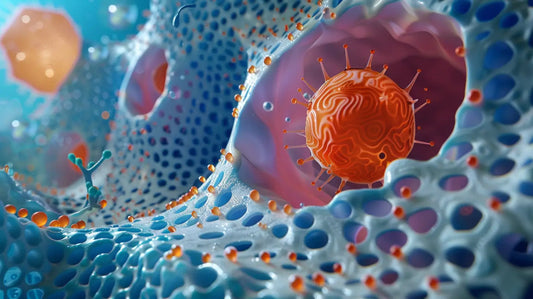L'histoire de l'hydrogène : de la découverte élémentaire à la merveille médicale
UpdatedNotre engagement en matière d'exactitude et d'objectivité
Ocemida s'engage à fournir des informations fiables et impartiales. Notre équipe éditoriale, composée de rédacteurs expérimentés et d'experts médicaux, examine méticuleusement chaque article et guide pour garantir que le contenu est exact, à jour et exempt de tout parti pris.
Processus rigoureux de vérification des faits
Afin de maintenir les normes d’exactitude les plus élevées, nous adhérons aux directives de vérification des faits suivantes :
Sources fiables : Nous citons uniquement des sources fiables, telles que des revues à comité de lecture, des rapports gouvernementaux, des associations universitaires et médicales et des entretiens avec des professionnels de la santé agréés.
Fondé sur des preuves : toutes les affirmations et données scientifiques sont appuyées par au moins une source crédible. Chaque article comprend une bibliographie complète avec des citations complètes et des liens vers les sources originales.
Liens internes : Bien que nous puissions inclure des liens internes vers d'autres pages Ocemida pertinentes pour une meilleure navigation, ces liens ne sont jamais utilisés comme sources principales d'informations scientifiques.
Révision par un expert : un membre de notre équipe d’experts médicaux et scientifiques fournit un examen final du contenu et des sources citées pour tous les articles et critiques de produits liés aux sujets médicaux et de santé.
En suivant ces normes rigoureuses, Ocemida s'efforce de fournir aux lecteurs un contenu fiable et informatif.
Partager avec un ami
L’histoire de l’hydrogène est un voyage fascinant qui nous emmène de sa découverte en tant que gaz élémentaire à son application actuelle dans le domaine de la médecine.
L’histoire de l’hydrogène commence il y a près d’un demi-millénaire et continue de s’écrire aujourd’hui alors que les chercheurs explorent son vaste potentiel.
Premières découvertes : la découverte involontaire de l'hydrogène
Au début du XVIe siècle, Philippe Auréole Paracelse, un médecin et alchimiste suisse, découvrit par inadvertance l'hydrogène au cours d'une expérience impliquant un acide et un métal. Il observa un gaz inflammable particulier comme sous-produit, qui ne ressemblait en rien à ce qu'il avait déjà vu auparavant.
Au milieu du XVIIIe siècle, le philosophe et scientifique britannique Henry Cavendish a officiellement distingué ce gaz mystérieux de l'air inflammable qui forme de l'eau lors de sa combustion. Cependant, ce n'est qu'en 1783 que ce gaz a reçu son nom officiel. Antoine Lavoisier, souvent considéré comme le « père de la chimie moderne », a introduit le terme « hydrogène ». Dérivé des mots grecs « hydro » qui signifie eau et « gène » qui signifie créer ou former, hydrogène signifie essentiellement « former de l'eau ».
Le lien entre l’hydrogène et la médecine
Ce n'est cependant qu'à la fin du XIXe siècle que le lien entre l'hydrogène et la médecine a commencé à être exploré. En 1888, les Annales de chirurgie font mention des travaux du Dr Nicolas Senn, qui utilisait H2 (gaz hydrogène) pour des applications intestinales. Il s'agit de l'un des premiers cas enregistrés d'application de l'hydrogène en médecine.
L'hydrogène dans la plongée sous-marine
L'hydrogène a été utilisé au-delà de la médecine au milieu du XXe siècle. En 1943, Arne Zetterström, un ingénieur suédois, a utilisé pour la première fois l'hydrogène gazeux pour la plongée sous-marine. La marine américaine a adopté cette approche dans les années 1960, en utilisant un mélange d'hydrogène gazeux connu sous le nom d'Hydreliox pour atténuer le mal de décompression. L'utilisation par la marine a également démontré le profil de sécurité élevé de l'hydrogène.
Les avancées médicales du 21e siècle
Le tournant du siècle a suscité un intérêt accru pour les applications médicales de l’hydrogène. En 2007, un article révolutionnaire publié dans Nature Medicine expliquait comment l’hydrogène neutralisait de manière sélective les radicaux oxygénés cytotoxiques, plus communément appelés radicaux hydroxyles. Cette percée a déclenché une vague de recherches sur l’hydrogène, donnant lieu à plus de 600 études et revues publiées sur son utilisation médicinale potentielle.
L'hydrogène en Asie
Les pays d’Asie, comme le Japon, la Chine et la Corée, ont rapidement adopté cette nouvelle merveille médicale. De nombreuses cliniques ont commencé à proposer l’hydrogénothérapie aux patients atteints de maladies chroniques, obtenant des résultats remarquables. Aux États-Unis, l’hydrogène a principalement été utilisé comme complément, mais les recherches indiquent un avenir prometteur pour ses applications médicales.
Applications actuelles et perspectives d'avenir
Aujourd'hui, l'utilisation de l'hydrogène en médecine ne cesse de s'étendre. L'inhalation d'hydrogène a été approuvée en 2016 par le ministère japonais de la Santé, du Travail et de la Protection sociale comme traitement médical avancé du syndrome post-arrêt cardiaque (PCAS). Diverses organisations ont également été créées pour réglementer et informer sur l'utilisation thérapeutique de l'hydrogène, telles que le Molecular Hydrogen Institute et l'International Hydrogen Standards Association.
Conclusion
L'histoire de l'hydrogène est loin d'être terminée. Avec plus de 1 500 études scientifiques sur l'hydrogène en tant que gaz médical et une industrie de l'hydrogène thérapeutique en pleine croissance dans le monde entier, l'avenir de ce gaz élémentaire s'annonce prometteur. À mesure que la recherche se poursuit, le potentiel de l'hydrogène pour traiter une variété de maladies et d'affections chroniques devient de plus en plus évident, ce qui en fait non seulement un gaz élémentaire, mais une véritable merveille médicale.
Table des matières










































